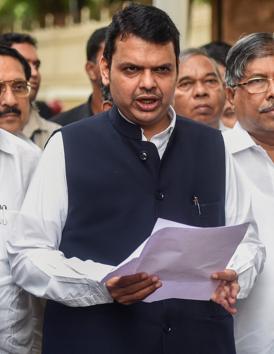Maratha stir: Fadnavis has very little time, and very little space to manoeuvre
Since July 2016, the community has organised more than 50 silent marches across the state, and each of these was attended by hundreds of thousands of people. Though there was no violence in any of those marches, the agitation in July this year took a violent turn, and since then, seven persons have committed suicide, angering the community further.
On Sunday, August 5, in a hastily arranged televised address, Maharashtra Chief Minister Devendra Fadnavis announced that the BJP-led state government will begin legal consultations for reservation in government jobs and educational institutes for the Maratha community. He said his government would aim to complete the constitutional formalities by the end of this year, and that before the end of 2019, table a bill in the assembly to enact a law on reservation. He has also put on hold 72,000 government jobs, one of the major demands of the Marathas.

This has not placated the community outfits, though. They want a written assurance from the government, or else, they say, they will continue with the agitation from August 9. Mr Fadnavis faces a unique problem in Maharashtra when it comes to the Maratha community’s demands. The community comprises 32% of the state’s population, and is a politically potent force. It has significant representation in the state legislature as well as in local governments and other civic bodies across the state. The previous dispensation led by the Congress and the Nationalist Congress Party (NCP) announced reservations for the community in 2014, but it was set aside by the Bombay High Court. This was challenged in the Supreme Court, which sent the matter back to the High Court, which asked the government to demonstrate the backwardness of the community. It was left to the Fadnavis government to address the concerns of the community, even while maintaining the sanctity of the court’s order.
Since July 2016, the community has organised more than 50 silent marches across the state, and each of these was attended by hundreds of thousands of people. Though there was no violence in any of those marches. The agitation in July this year took a violent turn, and since then, seven persons have committed suicide, angering the community further.
Interestingly, the Maratha Kranti Morcha (MKM), the umbrella organisation behind the agitation, seemed to have briefly lost control of some of its members who went on to create fringe groups that allegedly indulged in the July violence. Hundreds of activists were either booked or arrested in major cities such as Mumbai, Navi Mumbai, Thane, Pune, and Aurangabad. Though the MKM has promised there will be no violence after August 9, the state government cannot take chances.
Mr Fadnavis will, therefore, have to arrive at a short-term solution as well as a long-term strategy to calm nerves as well as keep his party’s prospects alive in the next state and general elections slated for 2019. His government will also have to convince the High Court that the Maratha community is economically and socially backward, and that it deserves reservation.
It is no consolation that Mr Fadnavis is Brahmin by caste, a fact that may create a trust deficit between the two sides. The Fadnavis government has very little time, and very little space for manoeuvre. It will require all the skills of the seasoned state politician to overcome this challenge.






